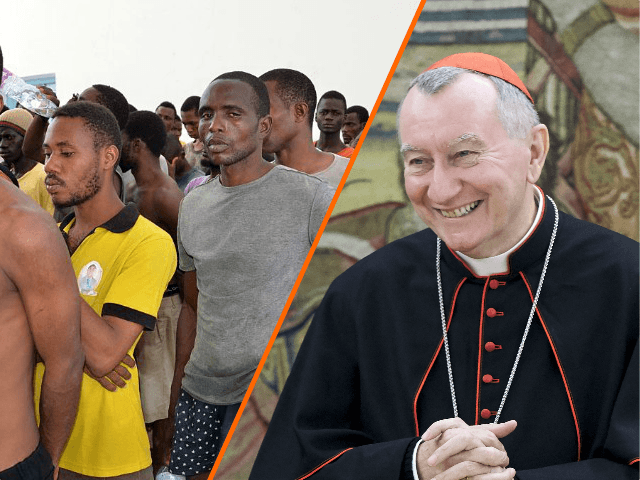“Closing ports is certainly not the solution” to Italy’s migrant crisis, said Vatican Secretary of State Cardinal Pietro Parolin Wednesday.
Cardinal Parolin made his remarks to journalists after having met with Italian president Sergio Mattarella. “We talked about international issues more than anything else,” Parolin said of his meeting. “The president had returned from a trip to the Baltic countries, and I recently made a trip to the Balkans. We talked about European perspectives and of migrants in this context.”
Asked by one reporter about the Italian government’s recent decisions to deny permission for debarkation to NGO vessels transporting migrants from North Africa to Italy, Parolin said, “we have already expressed our concerns,” adding that “closing ports is certainly not the solution.”
“Assisting the less fortunate and sharing knowledge is one of the most fruitful ways to support the development of peoples,” Parolin said.
The cardinal’s words add to the growing public opposition from Italian prelates to the efforts of interior minister Matteo Salvini to fulfil his campaign promises of dealing effectively to curb mass immigration into the country.
The president of the Italian Bishops’ Conference, Cardinal Gualtiero Bassetti, recently declared that “the logic of Christianity” has always been “to welcome, accompany, integrate, as the Pope says, and certainly, if there is a ship that is at sea, you cannot close the ports, and certainly we cannot risk leaving people to die or putting them in a predicament.”
While insisting he does not want to “interfere with government matters,” Bassetti said he was merely laying down “the thought of the Church.”
“The thought of the Church is that of the Samaritan, the parable of the good Samaritan and Jesus, where Jesus takes care of him,” he said, “the logic of Christianity is to take care of people.”
The critical positions of Italian Church leaders toward the actions of the Conte government highlight another noteworthy phenomenon: the growing rift between lay Catholics and clergy over the issue of immigration.
Matteo Salvini, the leader of the League party who is best known for his staunch opposition to unchecked mass migration, is the most trusted politician in the country by a significant margin, in large part because he has faithfully acted on the promises he made during the election campaign.
When Salvini refused debarkation rights in late June to the NGO vessel Aquarius that was carrying hundreds of African migrants, however, the Italian bishops were among those protesting most loudly.
“It is Jesus coming to us on a vessel, he is in the man or child who drowns, it is Jesus who fishes through the garbage in search of a little food,” said Cardinal Francesco Montenegro, archbishop of Agrigento, in his homily on July 1.
While not all the clergy support open borders and not all lay Catholic are favorable to Salvini’s policies, the clerical voices receiving the most attention all seem to lean toward unchecked immigration, despite the Church’s officially nuanced teaching on the matter.
The more that Church leaders invest their moral capital in this eminently political issue, the more they risk being perceived as woefully out of touch with the realities lived by the rank and file members of their flocks.
Follow Thomas D. Williams on Twitter Follow @tdwilliamsrome

COMMENTS
Please let us know if you're having issues with commenting.